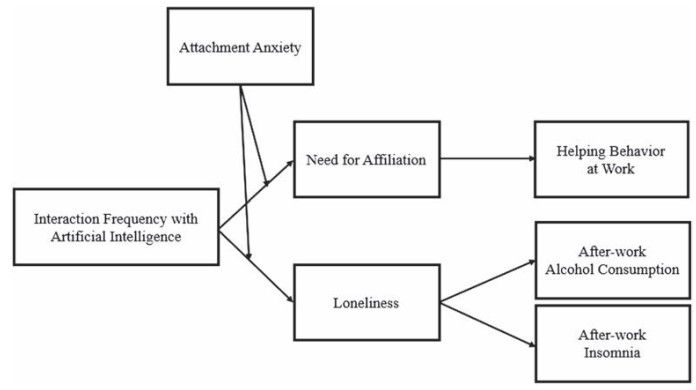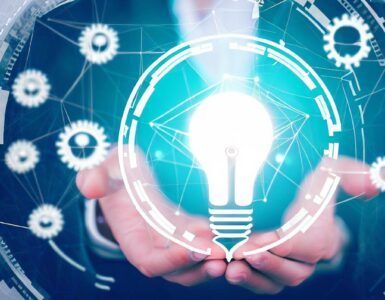Summary: An research published in June 2023 in Journal of Applied Psychology indicates that interactions with AI can lead to feelings of loneliness, which increase insomnia and alcohol consumption. However, Human-IA interactions also stimulate the need for social affiliation, leading to greater self-help behavior towards colleagues. Here's why and how to react.
“No person is an island”
L’intelligence artificielle (IA) est de plus en plus intégrée dans les fonctions organisationnelles et dans la vie professionnelle des employés. Cette fusion des employés et des machines modifie fondamentalement les interactions de travail auxquelles les employés sont habitués, les amenant à interagir davantage avec des systèmes d’IA plutôt qu’avec des collègues humains. Cette augmentation de l’interaction entre les employés et l’IA préfigure un glissement vers un système plus “asocial”, où les employés peuvent se sentir socialement déconnectés au travail.
“No person is an island: Unpacking the work and after-work consequences of interacting with artificial intelligence” is the title of the research article. No individual is an island: we know that social relationships are fundamental to individual well-being (Umberson & Karas Montez, 2010).
The researchers theorize that the more employees interact with AI in pursuit of their work goals, the more they feel a need for social affiliation, which can contribute to increased helping behavior towards colleagues in the workplace. However, they also experience a sense of loneliness, which can then affect employees' well-being after work (i.e. more insomnia and alcohol consumption).

When using AI at work, the increased need for social affiliation would explain self-help behavior, while the increased sense of loneliness would induce more alcohol consumption and insomnia.
Source: Tang et al (2023)
This is the result of four studies involving 794 employees in four different regions (Taiwan, Indonesia, USA and Malaysia).
Consequences for organizations
Companies need to realize that adopting AI can have a significant impact on their employees' well-being.
One immediate reaction could be to ban the use of solutions like ChatGPT in the workplace, to prevent these negative effects. Some companies have already done so.
Mais cette mesure serait totalement contre-productive. En effet, vous ne feriez que promouvoir un “shadow GPT” incontrôlé, avec des secrets professionnels exposés et des comptes utilisateurs potentiellement piratés (voir notre article sur l’avantage d’utiliser un Customized GPT).
What's more, employees would find themselves even more alone, left to their own devices, with the guilty feeling of knowingly breaking their organization's rules.
So what can we do?
Les entreprises pourraient envisager de former leurs employés à travailler efficacement avec l’IA, afin d’encadrer les usages et de minimiser l’anxiété qui pourraient découler de l’interaction avec ces systèmes. Il pourrait également être bénéfique de concevoir des systèmes d’IA qui sont plus “sociaux” et collaboratifs qui favorisent une interaction plus naturelle et humaine.
A noter que la stimulation du besoin d’affiliation sociale dû à l’interaction avec l’IA peut être bénéfique pour une organisation car elle favorise les comportements d’entraide entre les employés. L’IA devient un nouvel “objet frontière” qui permet de créer du lien. Mais attention ! Il est impératif d’introduire des garde fous. Selon les auteurs :
Opportunities for socialization unrelated to AI must be offered to mitigate the socially deficient work situation caused by interactions with AI.
By taking these findings into account, companies can develop policies and practices that encourage interaction and collaboration between employees in an environment, with both (1) an AI-related place of mutual support but also (2) non-AI socialization mechanisms.
This could include initiatives such as team brainstorming sessions, group projects and collaborative workspaces with and without AI.
ChatGPT for individuals vs GPT for groups
It's easy to see how individual use of ChatGPT can lead to isolation. A more appropriate approach is to promote the collective use of AI. Instead of individually querying ChatGPT in a strictly individual context, employees could use it as part of collective projects, where the machine's results and suggestions would be shared with real humans. This would allow AI to be integrated more seamlessly into human interactions, strengthening collaboration and innovation within the organization.
By adopting this approach, organizations can create a work culture that values human interaction while leveraging the benefits of these powerful technologies (to find out more, click here).
What does MARYLINK have to offer on this track?
By integrating AI into discussion, ideation and project management spaces, MARYLINK focuses not only on productivity, but also on human interaction and knowledge sharing.
This integration also promotes inclusion, ensuring that all team members can contribute to and benefit from GPT. Instead of feeling isolated or threatened by these new technologies, employees can see how AI can improve their work, make their tasks easier and help them solve problems more effectively.
What's more, sharing the results of interactions with AI can foster a sense of community and cooperation. This enables employees to learn from each other, share experiences and find solutions to common challenges together. It also creates a culture of continuous learning, where employees are encouraged to experiment and adapt as technologies evolve.
By encouraging collaboration and sharing, and minimizing isolation, a MARYLINK platform can help reduce the stress, anxiety and loneliness associated with using AI.
By emphasizing the role of AI as a facilitator rather than a substitute for human interaction, MARYLINK helps maintain a sense of belonging and community in organizations.




